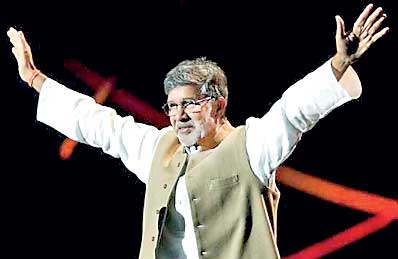Wednesday Feb 25, 2026
Wednesday Feb 25, 2026
Friday, 10 July 2015 00:00 - - {{hitsCtrl.values.hits}}
NEW DELHI (Thomson Reuters Foundation): International donors must boost aid to developing nations to ensure that millions of the world’s poorest and marginalised children can go to school, a group of Nobel laureates said on Monday, ahead of a global conference on financing for education.
Nobel Peace Prize winner Kailash Satyarthi said he had brought together the world’s most renowned science laureates for the first time to urge rich nations ‘to be more generous’ on the eve of the Oslo Summit on Education for Development.
“Donors have failed to deliver the investments needed for education,” the Indian child rights activist told the Thomson Reuters Foundation in an interview by phone from Stuttgart, Germany.
“That is why I brought the issue before a group of Nobel laureates last week and they agreed to speak out clearly through an open letter on the need for more financing for education as well as ending child slavery.”
According to the United Nations, 58 million children remain out of school and 781 million adults are illiterate despite a 2000 global agreement to increase enrolment in primary schools and half adult illiteracy, amongst other goals.
An April report by the UN educational arm UNESCO said that two-thirds of the countries – including Niger, Pakistan and Ethiopia – had missed some of the goals, while others such as Nepal, India, Rwanda and Sierra Leone had improved access to schooling.
Satyarthi said currently only 4% of all Overseas Development Assistance (ODA) was targeted at education, arguing it should be between 15 to 20%.
“We need an additional $22 billion annually, which is not that much. If you compare it to the global defence budgets, it works out at four and a half days of military spending,” he said in an interview.
“The best defence is investment in education. If we had invested in education, today the world would be much safer. Education is not only the key to sustainable development; it is also the best shield to defend against terrorism, insurgencies and other obstacles which impede the progress of humankind.”
Satyarthi said that he and the other laureates wanted to use their collective influence to ensure adequate funds for education were promised as nations meet in September to agree on a new set of development targets for the next 15 years.
“The Oslo Summit on Education for Development occurring this 7 July will be critical for discussions on financing for education,” said the open letter which was signed by scientists such as chemical physicist William Moerner, astrophysicist Brian Schmidt and biologist Elizabeth Blackburn.
“We urge the international community to loosen the purse strings for the future of our children, to protect them from exploitation and violence, and to invest in their education.”